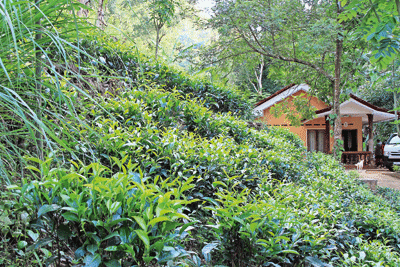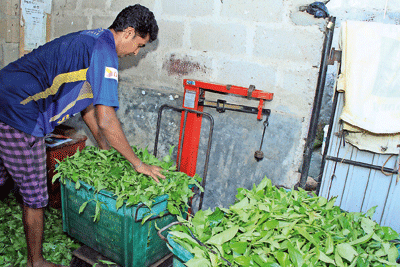Southern teas left in the lurch
View(s):
A tea smallholder's estate adjoining a residence. Pix by Indika Handuwala
By Sunimalee Dias
KALUTARA – Tea smallholdings have become the model that the regional plantation companies seem to want to catch up with in view of lower productivity on company estates.
However today the yield on these tea estates too (owned by smallholders) have declined substantially and without adequate government funding and new factories permitted to operate, they have been left to straddle with a number of issues on their own.
Only about half the yield is being cropped today and this has affected all stakeholders in the sector from the workers, estate owners to the factories and the tea collectors. The Business Times during a visit to the low grown tea plantations in Kalutara last week found that due to the low yield of the crop most estate owners would be involved in cultivating other crops like pepper and cinnamon that fetch a high price.
On the estate
B.S. Chandrasiri, a tea smallholder, said that today they were saddled with problems of having to spend more on fertilizer since the government was not subsidizing it. As a result the fertilizer previously bought at Rs.1,300 was now costing them nearly Rs.3,000, he explained.
Despite submitting the relevant forms to obtain the subsidy he noted that the authorities have stated that they would not release the funds to Kalutara since they have observed that there is a larger extent of tea cultivating lands in this district.
The ban on Glyphosate, a weedicide, has imposed a heavy burden on the planters as it meant extra work and more cost at around Rs.15,000 per month. Mr. Chandrasiri explained that since they did not have the required chemical they were compelled to use manual labour which was already in short supply in the area.

Perumal Gnanamari
About eight workers on these estates would pluck tea for about three days a week on one acre of land but this workforce has reduced to about three for a week, the estate owner complained. He said that they would pay Rs.500 for 20 kg plucked per day with tea and lunch.
Mr. Chandrasiri, also the former Chairman of the tea smallholders association in the area, said that he had about two acres of tea land that would produce 800 kg of tea per month compared to 1000 kg of tea produced in 2013. Next year they were scheduled to carry out re-planting. Every two and a half year plants would be pruned on the estates, he said.
He stated that due to the labour shortage he too was compelled to get involved in plucking tea on his estate. They are paid 21.5 per cent of the auction price by the tea factories.
Mechanisation has not become a popular venture, Mr. Chandrasiri explained due to the fact that this would lead to the mature and small leaves being plucked which could be avoided with manual labour.
Mixed labour force
Due to the second generation labour force of the Indian origin workers joining other sectors like the apparel industry there were inadequate people to pluck tea today, he said.
The Indian origin workers living on the RPCs- run estates were attracted to working on the smallholder properties due to the advantage of obtaining a daily wage with better benefits like lunch and tea whereas on the RPCs they have to make their own bread.
In fact most of the estate workers were Sinhala people from the area who would own their own small plots of tea lands within their home compounds.
The Sinhala residents also owners of small tea estates would be working elsewhere in Colombo and leave their properties in the hands of these workers with proper supervision.
But payment on these type of estates is higher at Rs.25 per kg since these property owners are not able to provide workers with meals.
Tea smallholdings are usually properties that would be three to four generations-old lands with deeds and in Kalutara these are located on hills and even up in the mountainous areas often hard to get to.
In fact an interesting fact of how the workers would bring down these plucked teas in sacks to one location is through a conveyer belt.

Sanjeewa Jayakody
One of the workers we spoke to Ms. Perumal Gnanamari who had just finished plucking said that she has been sick for eight months and as a result was not working on the RPC estate on which she lives.
But she would report now and then to the smallholdings estate where we met her citing the fact that this allowed her to meet her daily expenses. Two of her children are married and one is on the lookout for a job, she said adding that her daughter is working on the RPC estate. With Rs.23,000 a month she stated that it was insufficient to meet her needs and noted that there was no difference between the payments made on the smallholdings and the RPC estates.
Another plantation worker who is currently running a shop on a lease rental, Mr. Parameswaran complained that they were not provided toilet facilities, proper roads and no Samurdhi benefits either.
He even complained that the trade unions were siding with the companies and not assisting them today.
Mr.Parameswaran happens to be a third generation descendent of the Indian origin labour force that entered the country during the British colonial era. “I went to India twice,” he said explaining that since his grandfather was from India he was able to connect with his relatives from Kerala. He plans to live outside the estate on a house citing the fact that the line-room environment is not conducive for the children to grow up in. His son is currently employed at an insurance firm as a sales representative while his daughter is presently at home.
Poor leaf
A tea leaf collector who takes the stock to the factories, Nuwan Chamupathi said that they were faced with the problem of having to sell poor quality leaf to the factories.
He noted that when the leaf is brought to them from the estates they find that there are large stocks of poor quality leaf plucked by the workers.
Moreover, they are asked to bring these in crates which is not possible, he says since they have to collect these stocks from far off locations as a result of which they are brought in sacks and lead to wear and tear during transportation.
Some new factories that had come up had assured to buy the teas but he noted that they found out later that they were duped since they were left without any payment and the factories had closed without prior warning. Payments to the collectors are paid by around the 10th or 12th the next month.
The drought in the area is also not helping with the situation due to which the crops have been affected by low yields.
Factories have problems
One of the first stops on our trip to Kalutara was the Ganganee Tea Factory on the road to Matugama where we talked to its Director Sanjeewa Jayakody who spoke of the multiple issues facing factory owners today and the problems of fetching a good price and a high yield.
Identifying one of the main reasons for the crisis as being the drop in international prices, he noted that the situation in the West Asian and Russian markets to which low teas grown cater to, has resulted in the factories and plantation owners’ low incomes.
He noted that the yield had dropped to 250 kg from an acre compared to 800 kg obtained about 10 years back.
Factory owners today want the industry stakeholders including the Sri Lanka Tea Board (SLTB), the Tea Smallholders Association (TSA) and the Tea Research Institute (TRI) to engage in overcoming the problems faced today.
Mr. Jayakody explained that they had held ministerial level meetings where issues of fertilizer, drought, how to increase production on existing estates were discussed but it was observed that the TSA maintained a low key.
He blamed the association for not making regular site visits to help the planter to overcome their problems of gaining a higher yield.

Nuwan Chamupathi weighing the tea leaf at the end of the day
Improper plucking of tea leaves and the shortage of workers was also highlighted while Mr. Jayakody noted that they were faced with issues of more new factories being given licences to operate by politicians.
Complaining of adulteration by certain factories, he complained they were found to be using a number of additives like sugar, honey and other products to ensure that the tea leaf would become black thereby using low quality leaf to do so.
The factory workforce has dropped in numbers, he said noting that despite most of the staff being permanent workers with about 60 women on payroll while they require about 75-100 male workers, only about 10 turn up. Payment at the factory is between Rs.645 – 900 per worker with compulsory work for about 23 days. But workers turn up for only 15-18 days of work, he said.
Problems on the estates even in the South continues and some believe the authorities can help address this situation noting that when certain organisations were established they functioned well but today they have failed to resurrect the old tea gardens mapping the island in small plots that find it hard to pull through.
However, issues like the drought and the poor quality leaf need to be addressed by workers and the planter although one and the other is left to fend for themselves with a lack of an understanding in pulling together in the face of the rising cost of living that has aggravated the current climate of low prices fetching in troubled international markets.



